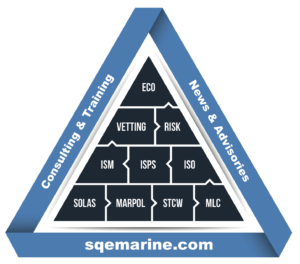WMU – Study
World Maritime University (WMU) launched a report, focusing on the systemic failures in the implementation of the regulatory regime for seafarers’ hours of work and rest, undermining the credibility of international regulations relating to working hours.
Scope of Study
The study aimed to achieve the following:
- Investigate stakeholder perceptions of the capacity of the current international regulatory framework to effectively prevent fatigue;
- To assess the barriers to effective implementation onboard ships; and
- To evaluate the level of compliance with the current regulatory regime.
Methodology
Study made use of semi-structured interviews, focus group discussions and case studies, to gain in-depth appreciation of seafarers’ recording practices, and a clear understanding of how different stakeholders deal with implementation, compliance monitoring and enforcement of the relevant provisions of the instruments of the International Labour Organization and International Maritime Organization.
Several maritime stakeholders – seafarers, port State control officers (PSCOs), representatives from shipowners’ organizations, industry organizations, maritime non-governmental organizations, and casualty investigators – were interviewed and participated in the study covering all possible viewpoints.
Critical Findings
Importantly, the study showed that there is stark criticism for the thresholds of existing regulations across different stakeholders, except for views expressed by a few shipowners’ organizations.
The three most criticized items were:
- The minimum safe manning levels
- The record keeping of work & rest hours.
- The ability of PSCO (or other) to check the proper implementation of work & rest regulations
Minimum safe manning levels
A key responsibility for each Flag Administration is to establish a minimum manning level for all ships registered. However, due to competition between flags (and pressure by Shipowners), the manning levels issued from Flag states for different types of ships do not always take into consideration all aspects of ship’s operation. These may be sufficient for safe navigation, but may not take into consideration other operational aspects such as pilotage, port navigation, cargo operations etc. Additionally, in many cases, they do not adhere to all principles for establishing minimum safe manning as listed in International Maritime Organization Resolution A.1047(27).
For example, take the minimum safe manning list of any Flag Administration for eg. Bulk carriers. There is provision for Deck Officers, Engine officers and ratings. However there is no provision for cook. So a quick questions arising from this fact is, why Companies employ cook on board. The obvious answer is, because the minimum safe manning may not include such provision but common practice and real life requirements lead to the need for a cook onboard in order to cover basic needs of the crew (catering). If this is the case then why other operational aspects of real life are not being addressed by managing Companies? If we ask a shipowner about this, the most probable answer will be that, the works and tasks on board run smoothly, there are no complaints from the crew and the records provide adequate feedback of conformance with regulations.
Record keeping
The effectiveness of recording practices to demonstrate compliance with regulations was widely questioned by research participants and viewed as purely a paper exercise for compliance purposes. Many of the recording software programs are deemed to be “gamed for success” to ensure compliance with the regulations and “incentivize” crew to adjust their records. The study revealed that a “culture of adjustment” has been developed between seafarers. Following this, culture work hours are either underreported or work/rest hour records are adjusted to facilitate compliance.
For seafarers, the sole objective of recording work/rest hours is to confirm compliance to avoid disruptions to vessel operations and not to confirm actual working time onboard. They seem unable to prioritize their allegiance: ship interests or regulations. They are trapped in cognitive dissonance, where deviance is normalized.
The case study included in the study is very explanatory for the way that records are kept:
Case
On 26 August, the ship proceeded from 0354 to 0700 with the Pilot to the berth apparently without the master working. Indeed, according to work/rest records, the master started his day of work at 0800 (one hour after ship arrival).
On 27 August, from 1506 to 1748, the same ship apparently completed cargo operation in one berth and sailed to another berth without the chief officer and master supervising cargo operation and participating in maneuvering operation.
Remarks
Contrary to hours of rest records, navigation practice and undoubtedly the ship SMS require the master to conduct the ship during pilotage/maneuvering and the chief officer to monitor cargo operations and participate in maneuvering.
Most companies seem to neglect seafarers’ feedback about work/rest hours, which signifies that they operate with deficient safety management systems unable to allow circulation of information and proper response to shipboard difficulties.
Systematic adjustment of records indicate that flag States’ surveys and audits are ineffective in verifying the implementation of regulations beyond paperwork, which questions the overall effectiveness of the International Safety Management Code.
Ability of PSCO (or other) to check the proper implementation of work & rest regulations
PSC is responsible for checking the implementation of regulations (including work & rest hours). However, in many instances, only two items are systematically checked; the watch schedule and the records of work/rest.
Taking into consideration the restriction in time for a PSC inspection (during which priority is given to basic safety and environmental items) and the “culture of adjustment” as described in previous paragraph, it seems very difficult for a PSCO to find clear grounds for more detailed inspection for work & rest hours.
Actions required
Ship Managers should:
- Create the required culture to shore based personnel and decision-makers to recognize the importance of human factors and the detrimental effects of fatigue on ship safety and occupational safety and health and show evidence of such training.
- Acknowledge and address any feedback from ships which may be of concern and respond to violations of working time standards or any justified request for additional crew.
- Regularly assess their ships’ manning levels with the crew’s input. Non-routine events or situations such as canal/channel crossing or heavy maintenance should immediately trigger pro-active company’s response with a manning level increment.
- Initiate fatigue management programs incorporating work/rest hours data verification.
- Promote the concept of a just culture to strengthen their reporting systems. Received work & rest hour violations not to be treated as reasons for victimization but to be used for corrective actions.
- Adjust Internal audit guidance to become an opportunity to assess safety beyond mere paper exercises.
- Test and implement innovative methods for record-keeping as long as they are ethically acceptable.
Seafarers should:
- Follow accurate and actual record-keeping procedures and report any violations of the work/rest hours to companies.
- Use the SMS complaint procedures (based on ILO and MLC requirements) to report any violations and malpractices.
You may also find further information on the WMU Study on Seafarers Work & Rest Hours at SAFETY4SEA


